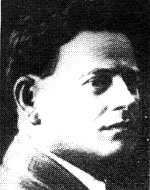Aaronsohn, Aaron
Son of Malka and Efraim-Fishel. He was born on May 21, 1876 in Baku, Romania. When he was six years old, he immigrated with his family to Eretz Israel and the parents were among the founders of the Zichron Yaakov settlement, where Aharon grew up and was educated. From the time he was a child, he became interested in nature and agriculture. At the age of 18, Baron Rothschild, the “well-known philanthropist,” left for Grignon in France. After two years of study in a high school of agricultural education and receiving a diploma, he returned to Israel. He toured the country and the neighboring countries of the Turkish Empire, expanded and deepened his knowledge of vegetation, and discovered discoveries in the fields of agriculture, including wild wheat (“Mother of Wheat”) in the vineyard of the Rosh Pina vineyards (1906). He also published scientific articles on his investigations and discoveries in professional journals in the United States and Europe, and added information by visiting sophisticated experience centers in the United States, where he also made connections with wealthy capitalists and some American Jewish leaders. In Atlit, located north of Zichron Yaakov, 3 km from the Mediterranean coast, an agricultural experimentation station that was begun in the building in 1910. After the outbreak of the First World War, the country was severed by a naval blockade imposed by the Allied armies, and two American ships began to transport food to the Yishuv. Arbat spread across the country and Aharon was appointed by the commander of the Turkish army He was one of the initiators and leaders of a group of Jews in the Land of Israel, Nili (“Netzach Yisrael will not lie”), who contacted the British military headquarters in Egypt and began to spy on her behalf and provide her with useful information in the military, economic, etc. In July 1916 he went to Constantinople and from there to the neutral Copenhagen. Went there on his own behalf for financial assistance to the Yishuv and the American entry War with Britain and its allies. He then arrived in Port Sa’id, Egypt, to strengthen the connection between Nili and the British Command, and since then a continuous naval connection between Port Sa’id and the Atlit pilot station was operated by the Managam ship through which the news was transmitted from Israel. The settlement was to receive gold coins from the Jews of the United States through the group. At the end of June 1917, General Allenby received command of the army in the region, and Aharon became one of his closest advisors and provided extensive information in preparation for the planning of the conquest of the country. At the end of 1917, on a mission to the United States, he received the Simcha news of the Balfour Declaration and the sad news about the bitter end of the Nili group, the suicide of his sister Sara, the murder of Reuven Schwartz, both of the group’s activists, and the hanging of Yosef Lishansky and Naaman Belkind After the conquest of the whole country by British forces and the end of the war, Aharon continued his political career in the British capital and his connections with the British Military Intelligence Service, and his close connections with some of the British policy leaders helped the political struggle of the Zionist movement. Weizmann. In April 1918 he was on a delegation of the “Committee of Delegates” who came to Palestine to implement the promises made in the Balfour Declaration and later joined the Zionist delegation to the Peace Conference in Paris. On the occasion of his work in preparation for the conference, he traveled extensively between New York, London and Paris. On 15 May 1919, on one of his flights from London to Paris, he died in an airplane accident over the Amanche Canal. A. assumedTwo brothers and a sister. This fallen hero is a “maklan” – a hero whose burial place is unknown.
